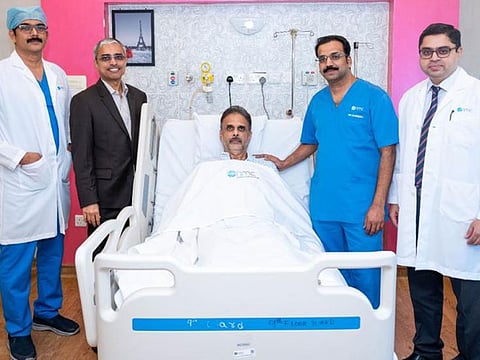UAE surgeons remove 4.65kg football-sized tumour from Indian patient’s stomach
Patient initially described his condition as a vague abdominal pain

Abu Dhabi: A 4.65kg tumour, the size of a football, was successfully removed from a 60-year old Indian male patient by doctors at NMC Specialty Hospital in Abu Dhabi.
Surgeons removed the tumour that was over 12 inches in width (when spread on the table) in a six-hour marathon surgery late last year, making it one of the hospital’s biggest surgical feats of 2022.
Doctors said “the 4.65kg tumour was resected en-bloc (removed intact) without leaving any residue and spared the patient’s vital four structures, including his colon, duodenum (first part of the small intestine), right kidney, and a major blood vessel called inferior vena cava. The patient had minimal blood loss and did not require any transfusion.”
‘Vague abdominal pain’
The patient, Yusuf Miya Ismail Ustad, who works as a carpenter and a physically active married man with two grown-up children, initially described his condition as “a vague abdominal pain.”
He had no lifestyle-related diseases such as diabetes or obesity, but he had been suffering from abdominal pains for over half a year before he decided to visit his doctor in late October last year.
Ustad went to Dr Nishanth, a general practitioner at NMC Specialty Hospital, Abu Dhabi. Dr Nishanth referred Ustad to Dr Balaji Balasubramanian, a surgical oncologist at the same hospital.
“After a clinical examination, Ustad was found to have a large mass occupying the whole right side of his abdomen. He had a CT scan which confirmed the presence and location of the large tumour. It extended from the under surface of the liver to the right side of his pelvis,” Dr. Balasubramanian told Gulf News.
“It was encasing the right kidney, pushing the duodenum (part of the intestine connected to the stomach) and right-side colon (the longest part of the intestine) to the left of the midline. The possibility of liposarcoma, a subtype of soft tissue cancer, was considered by radiological impression as a diagnosis,” he added.
Multidisciplinary team
Dr. Balasubramanian continued: “Fortunately, further evaluation did not show any distant metastases (spread of cancer). A multidisciplinary team composed of a surgical gastroenterologist, a urologist and tumour surgeons discussed his case and accordingly, Ustad was counselled for surgery to remove the cancerous tumour.”
The day of the operation was set after Ustad’s wife and their childrend arrived to Abu Dhabi from India. The ‘waiting time’ was also used by the medical team to chart a pre-operative plan.
Marathon surgery
Dr Nagendranath, surgical gastroenterologist at NMC Specialty Hospital and part of the surgical team, shared: “In Ustad’s case, the tumour was quite large — almost occupying more than 50 per cent of his abdominal cavity. It was closely associated with four important structures, including his colon, duodenum, right kidney and a major blood vessel called the inferior vena cava.
“We had a six-hour marathon surgery and the tumour was resected en-bloc (removed intact) without leaving any residue. Dr Balasubramanian led the team and Dr Yogesh Harish Bhandari, consultant urology, took care of preserving the kidney from surgical damage. The tumour weighed 4.65kg, and the patient had minimal blood loss, not requiring any transfusion,” Dr Nagendranath added.
Post-operation
Following the successful operation, Ustad’s case was again discussed by the medical team and it was decided to keep him on a close follow-up as there is a 30 per cent chance of the tumour making a comeback.
His doctors, however, were satisfied and happy that no adjacent organs were sacrificed, which improved Ustad’s rate of recovery in the absence of any fallout of surgery.
“Despite having such a rare and a potentially challenging tumour, Ustad’s surgery went on uneventfully and ICU (intensive care unit) post-operation was also not required. He went home six days after the successful operation,” a statement from NMC Specialty Hospital in Abu Dhabi said.
After the successful surgery, a grateful Yousuf said: “Cancer is treatable and curable. My family and I are profoundly thankful to the surgical and the nursing teams at NMC Specialty Hospital. After knowing the size of the tumour removed, I truly felt much fitter and healthier now.”
Liposarcoma
Ustad’s case is called liposarcoma, a rare type of cancer that develops in the fatty tissue. Doctors said: “Liposarcomas are cancerous tumours that are incidentally found once they snowball into a large size within a year.”
“The gold standard treatment protocol is a complete resection (surgery or removal of the tissue) The role of radiation or chemotherapy is found to be very limited. Such a type of tumour comprises about 10-15 per cent of all sarcomas. In contrast, about 80 per cent of all tumours in the retroperitoneum region are cancerous. Incidence is about 2.7 people per one million of the population. The usual age when it is encountered is above 50 and equally seen in both male and female,” the medical team added.
Sign up for the Daily Briefing
Get the latest news and updates straight to your inbox


